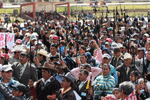The ESCR situation of peasants (women and men) in Latin America
Published on Thu, 2013-11-14 13:45
Representatives of the Latin American Coordination of Rural Organizations (CLOC- Via Campesina), and the Center for Legal and Social Studies (CELS) raised the question of the Economic, Social and Cultural Rights (ESCR) of the rural communities of Latin America and the Caribbean at a regional hearing before the Inter-American Commission on Human Rights (IACHR). The hearing took place in Washington in the 149th regular period of sessions of the IACHR. The presentation was accompanied by a report which describes the obstacles to the full enjoyment of the economic, social and cultural rights of the rural communities in Latin America, with a strong focus on their rights to food and territory; the particular situation of rural women; and the persecution and criminalization of the rural communities struggle. The aim of the hearing and the report was to provide direct information to the Commission in order to deepen its diagnosis on the particularities of the Human Rights violations that affect this group and for the Unit on Economic, Social and Cultural Rights to continue its approach to social organizations that had no previous contact with the Inter-American System. The CLOC- Via Campesina is a regional coalition with twenty years of constant commitment to social struggle which represents the movements of peasants, women and men workers, rural communities and African descendents all around Latin America. Currently, it gathers 84 social organizations from 18 countries in Latin America and the Caribbean, and is a direct ally of the Via Campesina International. The CELS has carried out an in-depth approach on Human Rights violations that communities face when the territory in which they live and develop their activities comes into dispute. In recent years, this subject has been treated jointly with the Indigenous Farmworkers National Movement (MNCI), which is part of the CLOC. Finally, CLOC and CELS have requested the Commission to acknowledge the rural community as a relevant and a specific social actor when assessing the human rights situation in the region and to include the various dimensions of this issue in their permanent agenda. The main issues to be addressed with the States on a regional level include the process and mechanisms of concentration, privatization and alienation of land, water and seeds and the persecution and criminalization of the rural communities. The report is available here.
Source: CELS. » |
SUSCRIBE TO OUR NEWSLETTER



